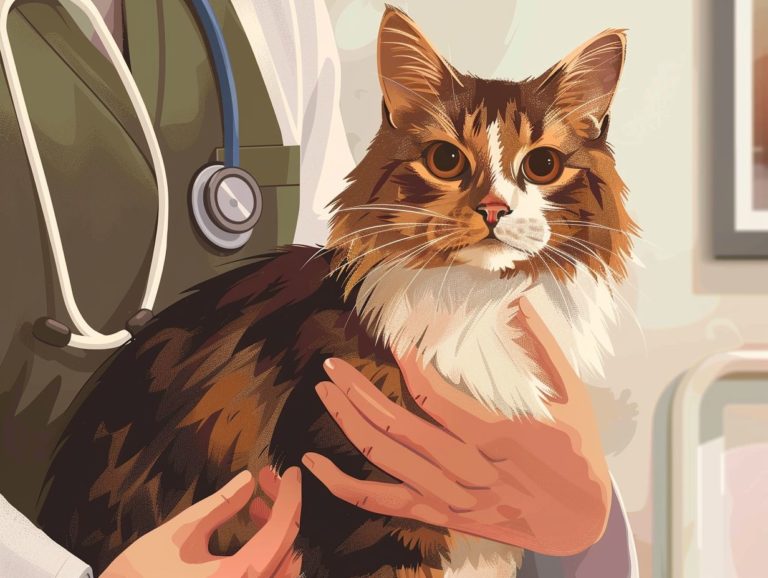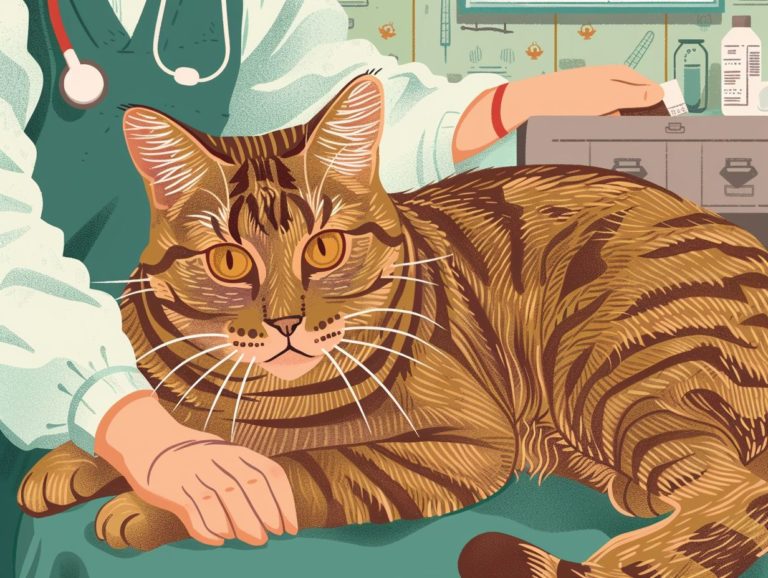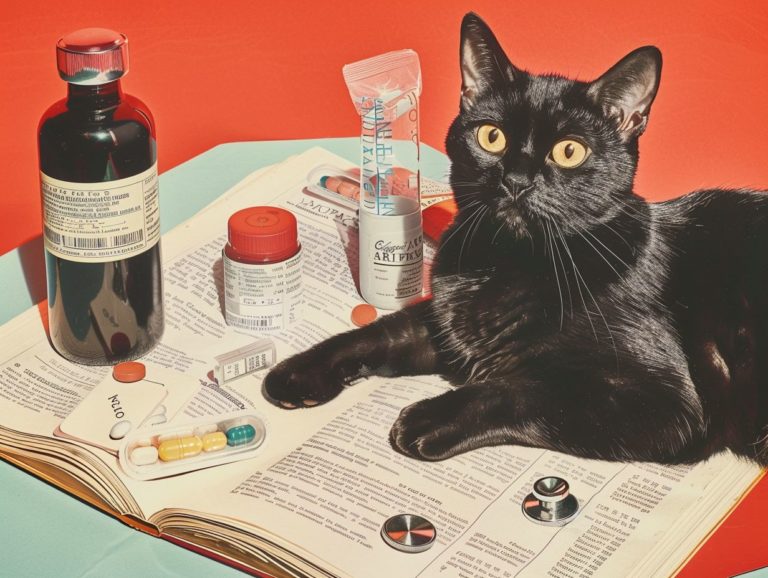The Importance Of Choosing An Accredited Pet Insurance Provider
Pet insurance is a vital product for pet owners as it offers financial protection against unforeseen medical expenses for pets. This comprehensive guide emphasizes the importance of selecting an accredited pet insurance provider, outlines the benefits of accreditation, and discusses key factors to consider when choosing a pet insurance provider. It also highlights the significance of reading the fine print, understanding exclusions and limitations, and provides tips on selecting the optimal pet insurance provider.
Key Takeaways:

Understanding Pet Insurance
Understanding Pet Insurance is crucial for ensuring the health and well-being of pets, as it offers financial coverage for veterinary expenses and health conditions that may arise over time.
With a variety of insurers and policies to choose from, pet owners must be well-informed to make the best decision for their pet’s specific needs.
Pet insurance provides peace of mind to pet owners, knowing that their pets will receive necessary medical care without causing financial strain. Insurers play a key role in assessing risks, determining premiums, and efficiently processing claims.
Coverage options range from basic plans covering accidents and illnesses to comprehensive plans that include wellness check-ups and coverage for hereditary conditions. Regulations from the National Association of Insurance Commissioners (NAIC) ensure transparency and consumer protection in the pet insurance industry.
Emerging insurtech companies like Lemonade are transforming the sector by offering digital platforms for easy policy management and claims processing, making pet insurance more accessible and convenient.
As pet healthcare costs continue to rise, investing in pet insurance can help offset the financial burden of unexpected medical expenses, enabling pet owners to provide their pets with the necessary care and attention.
What is Pet Insurance and How Does it Work?
Pet Insurance, also known as pet health insurance, is a policy offered by insurance carriers to cover expenses related to veterinary care for pets. It is a contractual agreement in which the insurer pays for part of or all pet medical care costs as outlined by the policy.
Pet insurance provides coverage for a variety of health conditions, treatments, accidents, and illnesses that may affect cats, dogs, or other pets. Pet owners pay a premium for the policy monthly or annually, with premiums determined by factors such as the pet’s age, breed, and overall health condition. Younger pets typically have lower premiums due to fewer risk factors compared to older pets.
The extent of coverage provided by a pet insurance policy depends on the policy chosen, ranging from basic routine checkups to emergency surgeries. The primary benefit of pet health insurance is that it offers financial relief when a pet experiences an unexpected accident or illness, ensuring that necessary medical care can be provided without causing significant financial burden to the pet owner.
Why Accreditation Matters
Accreditation is crucial in pet insurance as it ensures that a provider meets specific standards set by the accrediting body, often NAIC in the case of pet insurance, and upholds a reputation for excellent service. Accredited pet insurance providers often offer additional benefits and services to customers, demonstrating their dedication to providing valuable services. These benefits may include coverage for preventive care, reimbursement for alternative therapies, or personalized pet wellness programs.
Consumers can rely on accredited pet insurance providers to have transparent pricing structures and efficient claims processes, enhancing the overall dependability of these companies. Reputable insurers like Lemonade, known for their strong consumer trust in personal property insurance, boast high levels of customer satisfaction evident in positive reviews, offering peace of mind to pet owners seeking reliable pet insurance coverage.
Benefits of Choosing an Accredited Provider
Choosing an Accredited Provider for pet insurance offers numerous benefits to pet owners. Accredited insurers adhere to industry standards and regulations set by the NAIC, ensuring the pet owner’s best interests are protected. These insurers typically excel in customer service and provide additional benefits and services beyond basic insurance coverage.
Accredited insurers have revolutionized the insurance sector by incorporating innovative technologies and customer-centric approaches. Just like Lemonade Insurance has transformed the insurance industry, the pet insurance sector has also seen a similar revolution through the adoption of these strategies. Accreditation signifies that an insurance company has undergone rigorous assessments to ensure they meet the standards of transparency, financial stability, and reliability expected by customers.
With accredited providers, pet owners can anticipate efficient claims processing, tailored coverage plans, and access to networks of trusted veterinarians and specialists, ensuring comprehensive and personalized care for their pets.
Factors to Consider When Choosing a Pet Insurance Provider

When choosing a Pet Insurance Provider, factors to consider include pet insurance coverage options, exclusions, waiting periods, deductibles, premium, insurer reputation, customer reviews, and the insurer’s approach to leveraging innovative insurtech solutions like those offered by Lemonade. Pet breed and age play a role in coverage and premium considerations, influencing the overall decision-making process for pet owners.
It is crucial for pet owners to carefully assess the specific coverage details provided by each pet insurance provider. Understanding the extent of coverage, including whether it encompasses routine care, hereditary conditions, emergency visits, or chronic illnesses, is vital.
Policy limitations must be thoroughly examined to ensure there are no hidden restrictions that could affect the level of care for one’s pet. Evaluating the financial aspects of insurance, such as deductibles and premiums, is essential for determining affordability and potential out-of-pocket costs.
Taking into account the reputation of the insurance company, reviewing customer feedback, and keeping up-to-date with the latest industry technology can assist pet owners in making a comprehensive decision when selecting a pet insurance provider.
Coverage Options and Costs
Pet insurance providers offer various coverage options tailored to the needs of pet owners, with exclusions, waiting periods before coverage commences, and different premiums based on factors such as breed and age. Understanding these coverage options and associated costs is crucial for selecting the right policy.
Exclusions are common in pet insurance policies and typically include pre-existing conditions, elective procedures, genetic and congenital conditions that appear in early age, and specific hereditary conditions.
Waiting periods, ranging from 2-14 days for injuries and 14-30 days for illnesses, are standard in most policies to prevent pet owners from obtaining insurance in response to a recent diagnosis.
Premiums are determined by various factors, including species, breed, age, location, and coverage level. Pet owners should evaluate the value of the coverage option in relation to the cost. An older pet at higher risk of disease might benefit from a comprehensive plan, while a younger, healthy pet could be adequately covered by a more affordable accident-only plan.
Reputation and Customer Satisfaction
Reputation and customer satisfaction are crucial metrics for assessing the quality of service provided by a pet insurance provider. Reputation encompasses the timeliness and fairness of claims processing, efficiency of customer service, and fairness of premiums in relation to the service rendered.
Customer reviews serve as a key metric for evaluating the level of satisfaction among service users. Positive reviews indicate high levels of satisfaction, enhancing the insurance company’s reputation. A strong reputation fosters trust among pet owners.
Transparency in premium pricing, effective communication of coverage details, and the ability to fulfill commitments are essential elements in building trust. Consistent delivery on promises instills a sense of security and value among pet owners, leading to long-term loyalty.
Ethical business practices, prompt claims processing, and responsive customer support all contribute to the reputation and satisfaction levels of pet owners with their insurance provider in the pet insurance sector.
The Importance of Reading the Fine Print
It is important to read the fine print of a pet insurance policy as it contains crucial details about coverage, exclusions, limitations, reimbursement processes, deductibles, and the insurer’s regulatory compliance with standards set by organizations like NAIC.
Understanding these aspects helps pet owners in making informed decisions about which policy to choose for their pets. Exclusions are significant as they specify the medical conditions and treatments that are not covered, thereby preventing surprises when filing a claim.
Knowledge of reimbursement processes is essential as it informs owners about the amount and speed of reimbursement for eligible expenses. Deductibles play a role in determining out-of-pocket costs, making them an important consideration.
Ensuring regulatory compliance of the insurer assures owners that their pets will receive the care outlined in the policy.
Understanding Exclusions and Limitations
Exclusions and limitations in pet insurance policy documents are contractual conditions that pet owners should be aware of to properly set their expectations regarding insurance coverage. They describe conditions or treatments which insurance companies may not cover. Being aware of these exclusions and limitations can prevent negative surprises for pet owners during the claim filing process.
Common exclusions found in pet insurance policies include pre-existing conditions, elective procedures, and certain treatments that are described as experimental or investigational. Some policies include age and breed restrictions or exclusions. These exclusions and limitations can have implications for available coverage options for pet owners and the reimbursement of claims.
The National Association of Insurance Commissioners (NAIC) has set model regulations for the industry, and regulatory guidelines govern these exclusions to ensure transparency and fair practices in the pet insurance industry.
Tips for Choosing the Right Pet Insurance Provider

Choosing the right pet insurance provider involves comparing options by reading reviews, seeking recommendations from trusted sources to evaluate an insurer’s reputation and customer service quality, and exploring innovative solutions offered by insurtech companies like Lemonade. The reliability of an insurer can be assessed based on factors such as claims processing efficiency, coverage limitations, and financial stability.
Technological advancements have improved processes, providing greater convenience and quicker claim settlements for pet owners. Considerations like breed predispositions, pre-existing conditions, and the specific needs of your pet can help in narrowing down the search for the most suitable insurance provider. Keeping informed about pet insurance industry trends and offerings can give the power to pet owners to make well-informed decisions to safeguard their pets.
Research and Compare Options
When researching and comparing pet insurance options, it is important to look at specific policy details and compare different insurers to find the right policy for your pet.
In terms of researching insurers, individuals should examine policy specifics such as coverage limits, deductible amounts, and any exclusions that may impact your pet’s health. Comparing pet insurance providers allows you to gauge their reliability and responsiveness when processing your claim. Reviewing feedback and testimonials from previous customers helps in understanding their satisfaction levels and identifying any potential issues. Exploring insurtech insurers like Lemonade can help you discover user-friendly platforms and faster claims processing, leading to an improved pet insurance experience.
Read Reviews and Ask for Recommendations
Reading reviews and seeking recommendations are two of the most effective strategies for determining the best pet insurance provider. Reviews offer insights into the service quality of pet insurers based on the experiences of previous customers, while recommendations from other pet owners help identify trustworthy and quality insurance providers.
Companies like Lemonade have garnered positive reviews, reflecting not only satisfaction but also the credibility and trust associated with the insurance provider. By considering others’ experiences, pet owners can make more informed decisions aligned with their individual needs.
Endorsements and testimonials from fellow pet owners or industry experts are crucial in helping pet owners navigate the complex landscape of pet insurance options, ensuring that the chosen policy offers comprehensive coverage and reliable support in times of need.
Frequently Asked Questions
What is an accredited pet insurance provider?
An accredited pet insurance provider is a company that has been recognized by a reputable organization, such as the National Association of Insurance Commissioners (NAIC), for meeting certain standards and regulations for providing pet insurance coverage.
Why is it important to choose an accredited pet insurance provider?

Choosing an accredited pet insurance provider ensures that you are getting coverage from a reputable and trustworthy company. This means that they have met certain standards and regulations for providing pet insurance and are held accountable for their services.
What are the risks of choosing a non-accredited pet insurance provider?
Choosing a non-accredited pet insurance provider can put you at risk of not receiving the coverage you need for your pet. These companies may not have to adhere to the same standards and regulations, and may provide inadequate coverage or even deny claims.
How can I find out if a pet insurance provider is accredited?
You can easily find out if a pet insurance provider is accredited by checking with reputable organizations such as the NAIC. You can also do research online and read reviews from other pet owners about their experiences with the company.
Are there any benefits to choosing an accredited pet insurance provider?
Yes, there are several benefits to choosing an accredited pet insurance provider. These include peace of mind knowing that your pet is covered by a reputable company, access to a wider range of coverage options, and the assurance that your claims will be handled fairly and efficiently.
Is it worth it to pay for an accredited pet insurance provider?
While it may cost more to choose an accredited pet insurance provider, it is definitely worth it in the long run. By paying for a reputable and accredited company, you are ensuring that your pet will receive the best possible coverage and care when they need it most.




